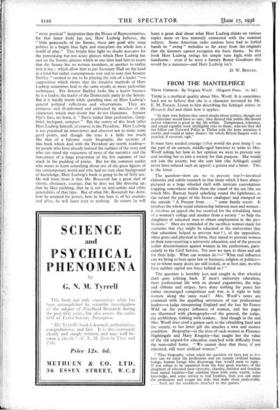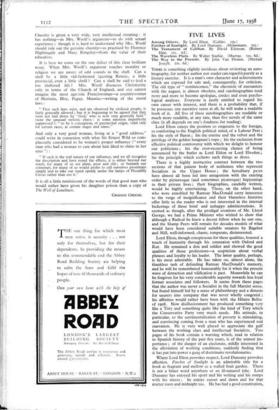FROM THE MANTELPIECE
Three Guineas. By Virginia Woolf. (Hogarth Press. 7s. 6d.)
THERE is a mythical quality about Mrs. Woolf. It is sometimes hard not to believe that she is a character invented by Mr. E. M. Forster. Listen to him describing the Schlegel sisters in Howards End and think how it applies.
"In their own fashion they cared deeply about politics, though not as politicians would have us care; they desired that public life should mirror whatever is good in the life within. Temperance, tolerance, and sexual equality were intelligible cries to them; whereas they did not follow our Forward Policy in Thibet with the keen attention it merits, and would at times dismiss the whole British Empire with a puzzled, if reverent, sigh."
It must have needed courage (what would the post bring ?) on the part of an earnest, middle-aged barrister to write to Mrs.
Woolf asking her how in her opinion we were to prevent war and inviting her to join a society for that purpose. She would not join the society, but she sent him (the Schlegels could
never have refused such an appeal) a guinea and a letter. This is the letter.
The question—how are we to prevent war ?—involved elaborate and subtle research in that brain which I have always pictured as a large whorled shell with intricate convolutions trapping somewhere within them the sound of the sea (the sea which Mrs. Ramsay heard splashing round the lighthouse, as she turned the pages of the Stores catalogue) and stamped on the outside " A Present from . . " some family resort. It involves the whole social relationship between men and women : it involves an appeal she has received for the rebuilding fund of a women's college and another from a society " to help the daughters of educated men to obtain employment in the pro- fessions." Men are reminded of the sacrifices women made for
centuries that they might be educated at the universities (has
that education helped to prevent war ? ), of the opposition, often gross and physical in form, they raised to prevent women in their turn receiving a university education, and of the present unfair discrimination against women in the professions, parti- cularly in the Civil Service. Yet now we turn to them and ask for their help. What can women do ?—" What real influence can we bring to bear upon law or business, religion or politics— we to whom many doors are still locked, or at best ajar, we who have neither capital nor force behind us ? "
The question is horribly just, and caught in that whorled shell goes echoing back. If men's university education, their professional life with its absurd pageantries, the wigs and ribbons and stripes, have done nothing for peace but rather encouraged competition and war, is it right to help women along the same road ? Mrs. Woolf's notes are crammed with the appalling utterances of our professional leaders—a judge interpreting England and the late Sir Ernest Wild on the proper influence of women, and her pages are illustrated with photographs—of the general, the judge, the archbishop, tinkling with.trinkets. And though in the end Mrs. Woolf does send a guinea each to the rebuilding fund and the society, to her latter gift she attaches a wise and austere condition. Biography—in the lives of such women as Florence Nightingale and Mary Kingsley—has taught her the value of the old unpaid-for education snatched with difficulty from the man-ruled home. " We cannot deny that these, if not educated, still were civilised women."
" Thus biography, when asked the question we have put to how can we enter the professions and yet remain civilised human beings, human beings who discourage war, would seem to reply : If you refuse to be separated from the four great teachers of the daughters of educated men—poverty, chastity, derision and freedom from unreal loyalties—bin combine them With some wealth, some knowledge, and some service to real loyalties, then you can enter the professions and escape the risks that make them undesirable. . . . Such are the conditions attached to this guinea."
Chastity is given a very wide, very intellectual meaning : it has nothing—in Mrs. Woolf's argument—to do with sexual experience ; though it is hard to understand why Mrs. Woolf should rule out the genuine chastity—as practised by Florence Nightingale and Mary Kingsley—from the value of their education.
It is here we come on the one defect of this clear brilliant essay. When Mrs. Woolf's argument touches morality or religion we are aware of odd sounds in the shell. Can a shell be a little old-fashioned (quoting Renan), a little provincial, even a little shrill ? Can a shell be said to lead a too sheltered life ? Mrs. Woolf discusses Christianity only in terms of the Church of England, and one cannot imagine the most agnostic Frenchwoman—a countrywoman of Maritain, Bloy, Peguy, Mauriac—writing of the moral laws :
" That such laws exist, and are observed by civilised people, is fairly generally allowed ; but it is beginning to be agreed that they were not laid down by ' God,' who is now very generally held " (note the unusual stylistic chaos : is some emotion imperfectly suppressed ?) " to be a conception, of patriarchal origin, valid only for certain races, at certain stages and times."
And only a very good woman, living at a " good address," could write in connexion with what Sir Ernest Wild so com- placently considered to be woman's proper influence (" every man who had a woman to care about him liked to shine in her eyes ") :
" If such is the real nature of our influence, and we all recognise the description and have noted the effects, it is either beyond our reach, for many of us are plain, poor and old ; or beneath our contempt, for many of us would prefer to call ourselves prostitutes simply and to take our stand openly under the lamps of Piccadilly Circus rather than use it."
It is all a little reminiscent of the words of that good man who would rather have given his daughter poison than a copy of The Well of Loneliness.
GRAHAM GREENE.



















































 Previous page
Previous page